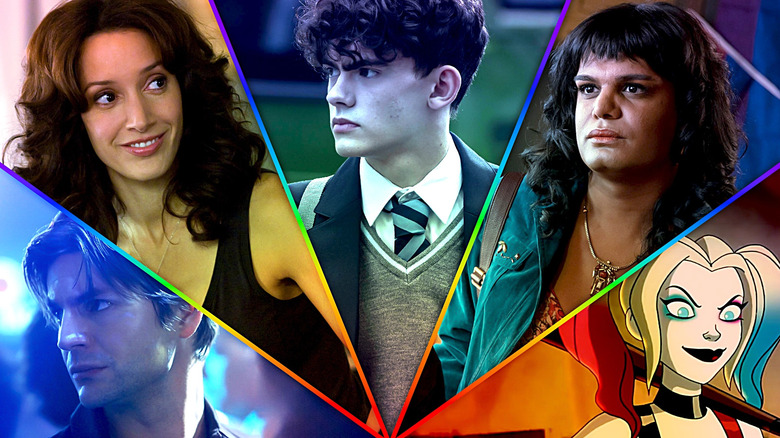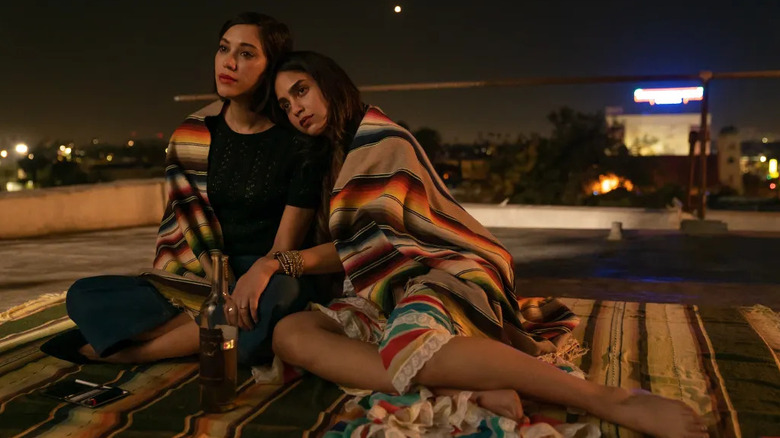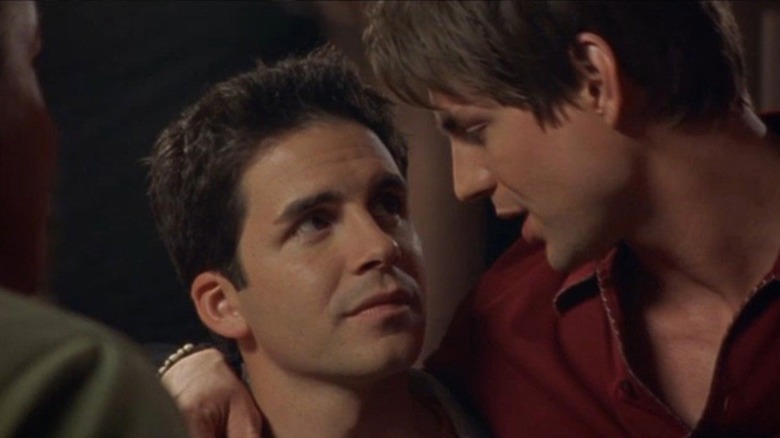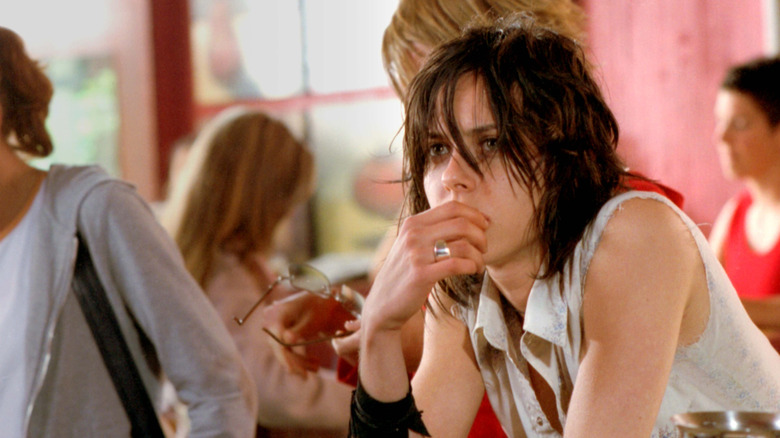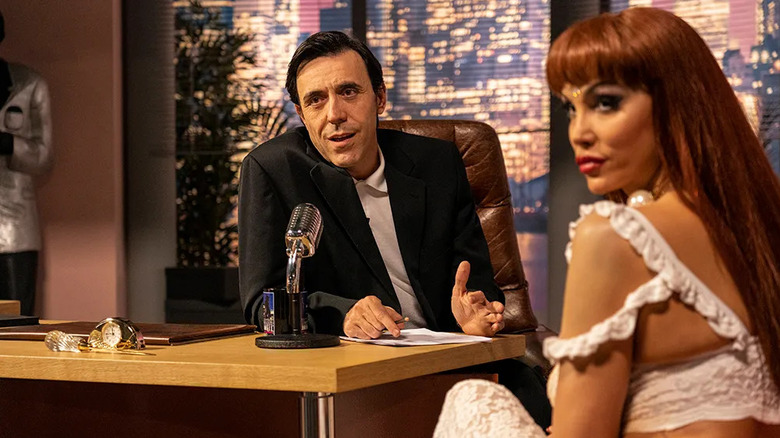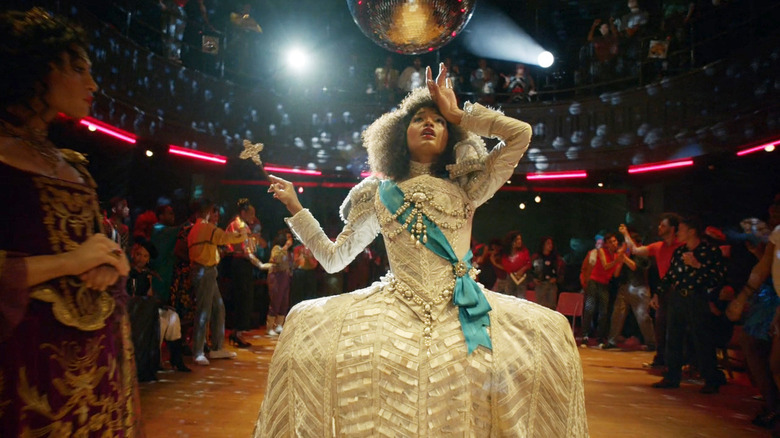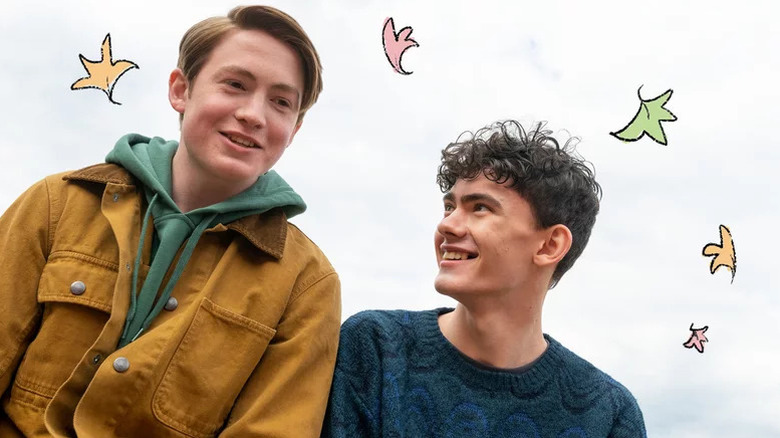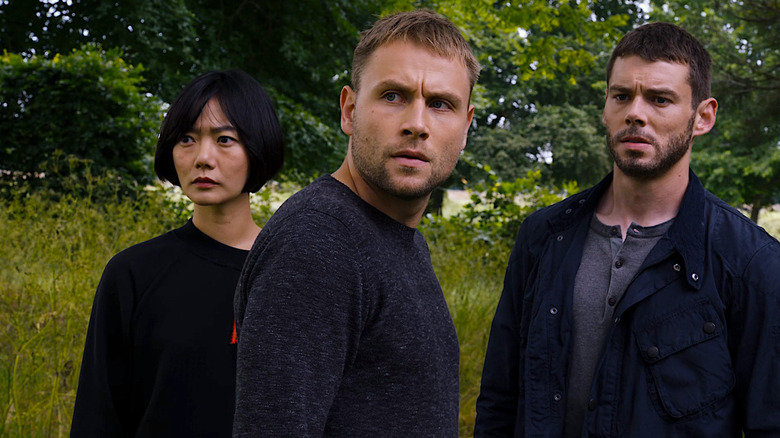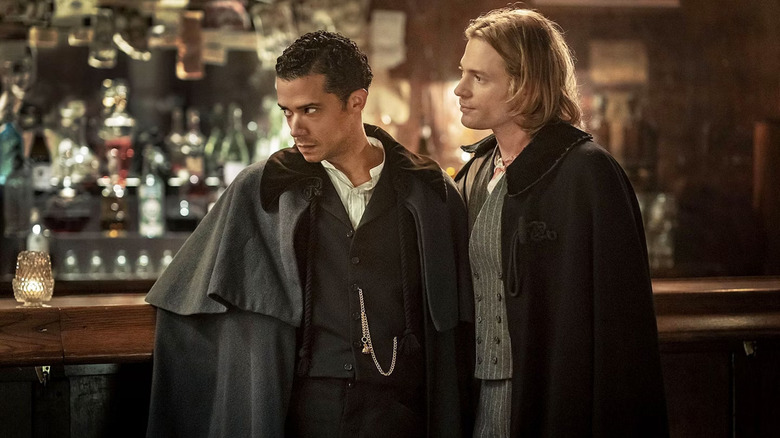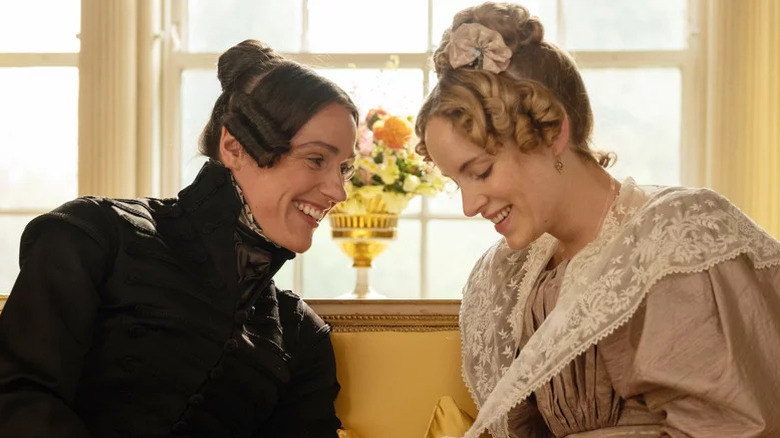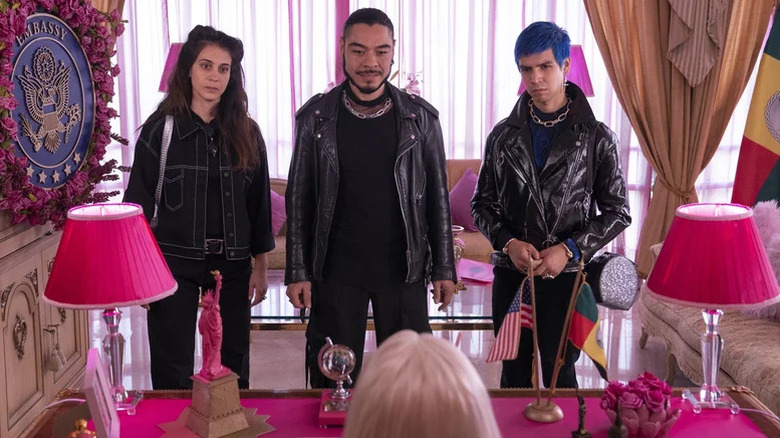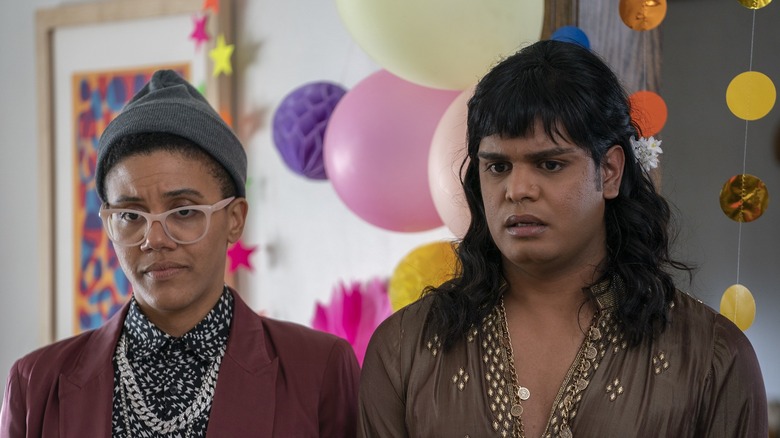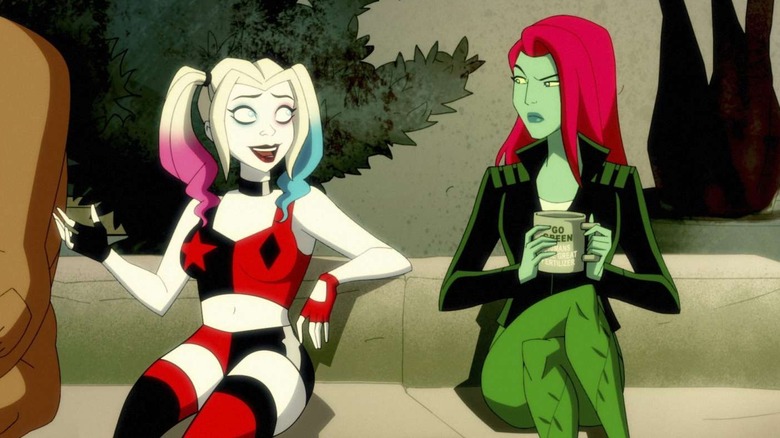12 Best LGBTQ+ Shows To Watch During Pride Month
We may receive a commission on purchases made from links.
In the last couple of decades, LGBTQ+ characters have become more and more common on television, though this history goes further back than you might think. As Shayna Maci Warner writes in "The Rainbow Age of Television," The first "expressly named gay character" appeared on the first episode of "N.Y.P.D." in 1967. Meanwhile, the first lesbian couple appeared on "The Bold Ones: The New Doctors" in 1972, though the first lesbian kiss on TV didn't occur until 1991 in an episode of "L.A. Law."
Queer representation has increased greatly since then, though GLAAD's 2023-2024 Where We Are On TV report indicates that there has been a decrease in LGBTQ+ characters in the last few years. Thankfully, many queer-centric shows from years past are available to stream (apart from the ones that have been pulled from streaming), meaning we still have a significant library of LGBTQ+ TV shows at our fingertips.
On the other hand, so many shows are available to stream now that it can be difficult to choose (or even find) what to watch. This Pride Month (or anytime really), you might be especially interested in seeing more queer and trans characters on TV, so we've created a list of some of the best LGBTQ+ shows to watch ASAP Clear your calendars, because you have hundreds of television episodes to watch this June.
Vida
One of the most criminally underrated shows of the last decade, "Vida" should be on your radar in June and every other month. The series follows two sisters, Lyn (Melissa Barrera) and Emma (Mishel Prada), who return to Boyle Heights neighborhood in East L.A. following their mother's death, which brings them to learn about her secret queer life and confront their shared history.
Emma, the eldest sister, has a high-powered job in Chicago, and her type-A, aloof personality doesn't endear her to her sister or other residents of the neighborhood. As a queer character, Emma's identity isn't a plot point in and of itself, but the shows' depiction of her sexuality feels novel. The queer sex scenes are distinctive and intimate, and the series depicts a wide range of queer women and non-binary people with varying gender presentations.
"Vida" also includes an older butch character, Eddy (Ser Anzoategui), playing a role rarely seen on television. Created by brilliant playwright Tanya Saracho, the show tells the story of queer Mexican-American characters through the lens of gentrification, identity, family, and grief. It's truly one of a kind.
Queer as Folk
One of the greatest British TV adaptations alongside "The Office," the Showtime series "Queer as Folk" was a pioneering LGBTQ+ show. Based on Russell T Davies' 1999 series of the same name, the series follows five gay men living in Pittsburgh: Brian (Gale Harold), Justin (Randy Harrison), Michael (Hal Sparks), Emmett (Peter Paige), and Ted (Scott Lowell). They are joined by a lesbian couple, Lindsay (Thea Gill) and Melanie (Michelle Clunie), who have a child thanks to Brian's sperm donation, as well as Michael's mother.
"Queer as Folk" isn't shy about delving into to controversial ideas. First of all, its sex scenes are fairly explicit, especially for the time, and in fact, the show's pilot includes the first gay sex scene in American TV history. But that wasn't the only first in "Queer as Folk," which also holds the record for depicting the first gay adoption on television, the first legally married gay couple, and the first HIV-positive/HIV-negative couple.
Like many LGBTQ+ shows and characters from decades past, viewers sometimes criticize "Queer as Folk" for being too cheesy or over-the-top. But to give the show credit, it isn't interested in depicting its queer characters as paragons of moral purity. Instead, its characters are messy, self-centered, and at times downright mean. As such, "Queer as Folk" is both wildly entertaining and an example of a queer story that hasn't been sanitized for the general public.
The L Word
Their second LGBTQ+ show of the 2000s, Showtime's "The L Word" follows a group of lesbians living in Los Angeles. These include Bette (Jennifer Beals), a bossy art museum director, her more demure partner, Tina (Laurel Holloman), Alice (Leisha Hailey, a mouthy radio host, Shane (Kate Moennig, above) a soft butch hairdresser and lothario, Dana (Erin Daniels), a closeted tennis player, and Jenny (Mia Kirshner), who has just moved to L.A. and is quickly learning she's not as straight as she thought.
"The L Word" is filled with tumultuous relationships and frequent cheating, and these women's love lives would take an extensive chart to track. It's a good thing resident gossip monger Alice created an actual chart connecting all the L.A. lesbians, and creating the defining artifact of the show in the process. To be sure, the show centers friendships and familial bonds (whether biological or not) as well, and these relationships produce some of the show's most entertaining moments.
Most criticisms of the show revolve around where it falls short in terms of representation, particularly regarding trans characters and people of color. The reboot, "The L Word: Generation Q," aimed to rectify some of these omissions, but it wound up feeling preachy and much too earnest. Your best bet is to stick with the original, which is equally parts funny, dramatic, sad, and deranged, a formula that's near-impossible to replicate.
Veneno
The HBO Max series "Veneno" appeared on the streaming platform with little fanfare, and that's a shame. The show tells the story of a transgender Spanish television personality, Cristina Ortiz Rodríguez, also known as "La Veneno." She became a public figure when a TV journalist interviewed her for a piece about transgender sex workers that aired on a late-night TV show. Audiences were immediately drawn to her, and she became a permanent fixture on the show shortly thereafter.
Based on a book by Valeria Vegas, "Veneno" imaginatively depicts the life of its title character. Three different actresses (Jedet, Daniela Santiago, and Isabel Torres) play La Veneno at different ages to unlock the mystery of her life. To that effect, the series gives equal weight to factual events and the fanciful content of La Veneno's imagination. "Veneno" follows its lead character from her traumatic youth to her rise to national fame, tracking the persona she molded over time.
But it's not just about La Veneno. The series also hones in on the trans and queer community around her, illustrating the power of found family and representation. La Veneno moves through life with other trans women at her side, including Paca La Piraña, La Veneno's real-life best friend, who plays herself. This community-focused aspect separates "Venono" from other LGBTQ+ media, which often depict a lonely character struggling to come out. With an impressive cast of trans characters played by trans actresses, "Veneno" makes its eight episodes count.
Pose
A sometimes controversial figure, entertainment mogul Ryan Murphy has a whopping 24 TV shows to his name. The FX series "Pose" is one of his best, in part because he wasn't the only voice in the room. Co-creator Steven Canals developed the series several years prior, and with Ryan Murphy and Brad Falchuck's help, it became an unexpected hit.
"Pose" follows members of the New York City ball scene, a Black and Latino LGBTQ+ subculture involving pageant-like competitions and the creation of distinct "Houses." The series features an incredible ensemble cast of Black and Latino trans women and gay men, marking it the largest trans cast in TV history.
But "Pose" is not just history-making, it's also great television. All of the actors do incredible work, and the show perfectly balances its humor and beauty with tension and tragedy. The series tackles issues such as the AIDS crisis, sex work, transphobia and homophobia, gentrification, and found family, without making any individual the poster child for these topics. Although the characters face numerous trials and tribulations, "Pose" still manages to highlight the joy and sense of belonging found within this community.
The series' authenticity is the result of the creatives working in front of and behind the camera. In addition to Canals, Murphy, and Falchuck, Janet Mock and Our Lady J worked as writers and executive producers on the show. As Mock told Billboard, "In the world I am writing, these women are the heroines I have always been waiting for."
Heartstopper
Young adult fare is a booming industry at the moment, and thankfully, at least some of that attention has been directed to queer and trans stories. "Love, Simon" made a splash when it premiered in 2018, as did its spinoff series, "Love, Victor." One of the most beloved LGBTQ+ YA stories in recent years, "Heartstopper" garnered a passionate fan base both as a Netflix series and in its original form as a graphic novel.
Created by Alice Oseman, the series follows a group of British queer and trans teenagers. Joe Locke plays the protagonist, Charlie, a gay student who deals with bullies at school and was outed the year prior. Charlie falls for Nick (Kit Connor), a popular rugby player who soon realizes he's bisexual. Charlie's friends include Tao (William Gao), an obsessive cinephile, the soft-spoken Isaac (Tobie Donovan), Elle (Yasmin Finney), an artistic, trans teen who's just transferred to an all-girls school, and Elle's new friends Tara (Corinna Brown) and her girlfriend Darcy (Kizzy Edgell).
If that sounds like the perfect smattering of LGBTQ representation, well, it is. But somehow, "Heartstopper" never feels too cookie-cutter or preachy, despite its ethos of representation and diversity resting right on the surface.. The show succeeds in large part due to its earnestness, especially when compared to previous queer-inclusive teen shows like "Skins." It's difficult to deny the pleasure of watching these teens find themselves and experience first love. "Heartstopper" is bound to make your heart flutter, even if high school remains a distant memory.
Sense8
When you think of the Wachowski sisters, you think of "The Matrix," right? Well, for some, the iconic duo's most beloved project is their first foray into television. In 2015, the Wachowskis launched "Sense8," a post-corporeal series that ties their entire filmography together. The mind-bending show, created for Netflix, follows eight seemingly unconnected people across the globe. These eight individuals learn they are mentally and emotionally linked and can access the skills, language, and knowledge of their fellow "sensates."
The sensates include a bus driver in Nairobi, a Korean kickboxer, a trans activist in San Francisco, a pharmacist in Mumbai, an Icelandic DJ living in London, a safecracker in Berlin, a closeted telenovela star in Mexico City, and a Chicago cop.
While the show includes a larger conspiracy story about the shady company responsible for their existence, the main characters and their relationships to one another are the heart of the show. It's fascinating to see the sensates get to know each other inside their own heads, and it's a delight every time they share their abilities to succeed or outsmart the people after them. "Sense8" sends a clear message about the power of empathy across difference, and the queer and trans characters are on the show are particularly important to fans, who continued advocating for the show after Netflix unceremoniously canceled it after two seasons.
Interview With a Vampire
You'd be forgiven for thinking that "Interview With a Vampire," both Anne Rice's novel and the 1994 film, has always been gay. While it's true that both versions of the story are filled with gay subtext, it wasn't until AMC's 2022 adaptation that subtext became text. The central focus of the series is the tortured gay romance between Louis (Jacob Anderson) and Lestat (Sam Reid). Before Lestat turned him, Louis was working as a pimp in 1910s New Orleans. Lestat's proposition, then, is not only an offer of eternal companionship but power as well.
The series serves as an allegory about power, oppression, and hierarchy in America, but unlike some other shows that traffic in such metaphors, "Interview With a Vampire" also includes the marginalized characters who live out these conditions. One of the great joys of vampire stories is how they allow for the disruption of morality and standards of the time, no matter the period in which they are set. Louis and Lestat can live in the world as queer men because they are vampires, but power dynamics still play out between the characters, both alive and undead.
While the show often reaches for melodrama and even camp, these characters have major problems, and the series demands that you take them seriously despite their flamboyance. A queer gothic romance filled with bloodlust and sex, you'll want to invite these vampires in.
Gentleman Jack
A mostly-out butch lesbian living in 1830s England may seem like a story too good to be true, but the BBC series "Gentleman Jack" draws from a primary source. Based on the real-life woman's thousands of journal entries, the series follows Anne Lister (Suranne Jones), a landowner and industrialist living in Yorkshire. We follow Anne Lister's business dealings around town, but most importantly, we see her blossoming relationship with Ann Walker (Sophie Rundle), an unmarried heiress.
Lister's many lesbian relationships are well-documented, but it's Ann Walker who inspires her to settle down. Despite the many obstacles they face, Lister and Walker figure out how to live together as companions and eventually wives, in part due to Lister's ambitious business practices.
Lister would be a unique woman in any decade, but she stands out even more in the 19th century. She dresses much like a man would, in a suit with a top hat and a cane. Suranne Jones' incredible performance as this astounding woman carries the show. She captures Lister's agility and brazen attitude with full-bodied commitment, but gives us a necessary glimpse into her vulnerability and insecurities as well.
Alongside Jones' performance, the show's filming style gives it great personality. Much like the superb "Fleabag," Lister often breaks the fourth wall, telling the audience her plans as she speed-walks to her next destination. It's a surprisingly joyful watch that balances romance with politics.
Los Espookys
Though HBO rudely canceled it after two seasons, "Los Espookys" is one of the best comedies of the last decade. It's difficult to describe "Los Espookys" or put it in any sort of box. Most frequently compared to "Scooby Doo!," the series follows a group of friends running a company that provides manufactured frights for their eccentric clients.
Created by Julio Torres, Ana Fabrega, and Fred Armisen, who also star in the show, "Los Espookys" takes place in a world divorced from our reality. Set in an unnamed Latin American country, the series is primarily in Spanish (with English subtitles) but sometimes in English (with Spanish subtitles). Renaldo (Bernardo Velasco), a horror enthusiast, founds the Los Espookys, which also includes Andrés (Torres), the heir to a chocolate heir haunted by a demon; Úrsula (Cassandra Ciangherotti), a goth dental hygienist; and her sister, Tati (Ana Fabrega), a spacey, simple-minded woman always working odd jobs (in the most literal sense).
The world of "Los Espookys" is filled with absurd elements that become the natural fabric of the show. One of Tati's jobs is moving the second hand of the town's (broken) clock. Andrés can literally speak to the moon — and she speaks back. Fred Armisen's character, Tico, is known for being a talented car-parker. Many of the characters are queer, but their identities are hardly remarked upon, much like the strange and wonderful magical realism of their environment.
Sort Of
The Canadian series "Sort Of" centers diversity and identity, but that description doesn't do justice to its nuanced storylines. Bilal Baig plays Sabi, a non-binary Pakistani-Canadian working as a nanny. Sabi is out to most people in their life, apart from their mother, Raffo (Ellora Patnaik). When Raffo sees Sabi at work sporting a feminine look, she's more concerned about Sabi's choice of employment than their gender identity. "Are you this man's servant?" she questions.
This scene exemplifies the series' clever rerouting of expectations. "Sort Of" takes identity as one of its central themes but not in a manner concerned with surface-level representation. Rather than tracking the characters' coming out stories or experiences of oppression, identity operates on many different levels. Sabi's biggest concern is not living as a non-binary person but balancing their identities as a nanny, a bartender at a queer bar, and their mother's child.
Though each episode only lasts 20 minutes, every character grows and expands. We learn about Raffo's struggle to focus on herself now that her children are grown up and her husband has moved away. Sabi's upbeat best friend, 7ven (Amanda Cordner), moves away but can't handle the loneliness. Sabi's sister and employers have their own emotional arcs as well. Every character has the freedom to move beyond stereotypes and live in a way that's much more human.
Harley Quinn
LGBTQ+ characters have become increasingly common in animated series, appearing in shows such as "Steven Universe," "Tuca & Bertie," and "The Legend of Korra." The same is true within comics, including Marvel and DC comics, though those queer stories rarely appear on the big screen. Luckily, the HBO series "Harley Quinn" doesn't adhere to the rules of the DCEU, which means it's incredibly queer, and an adult show in every sense of the word.
Kaley Cuoco voices the title character, who in this story has just left her abusive boyfriend, Joker (Alan Tudyk), going from sidekick to survivor. Wanting to become a force in the underworld, Harley gathers a supervillian crew comprised of Clayface (also Tudyk), Doctor Psycho (Tony Hale), King Shark (Ron Funches), Sy Borgman (Jason Alexander), and her best friend, Poison Ivy (Lake Bell).
"Harley Quinn" contains plenty of zany evil plots and hijinks, but Harley and Ivy's connection takes center stage. Ivy offers her unwavering support to Harley as she navigates her complicated breakup, and their friendship turns romantic. Despite their chaotic circumstances, Harley and Ivy's loving relationship feels genuine and heartfelt, and their love story grounds a show where violence, disaster, and dirty jokes are around every corner.
